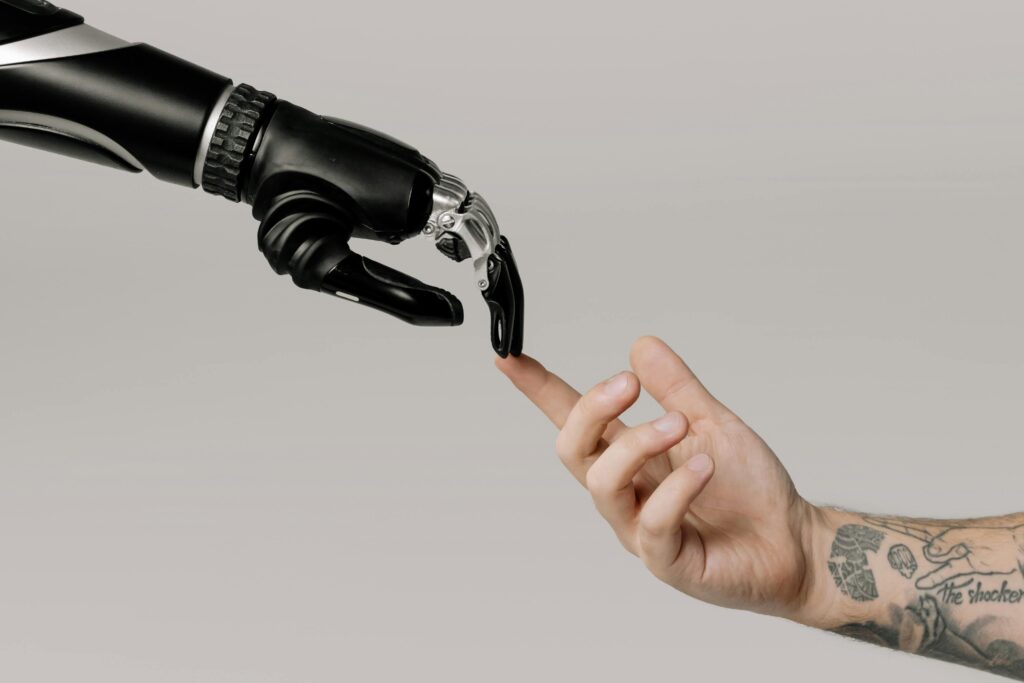
The stethoscope and white coat might still be symbols of medicine, but a new revolution is brewing in the sterile corridors of hospitals: the rise of artificial intelligence (AI). From diagnosing diseases to crafting personalized treatments, AI is transforming healthcare with an algorithmic touch, promising a future where technology heals alongside compassion.

Diagnosing with the Power of Artificial Intelligence (Ai):
Imagine an AI analyzing X-rays or CT scans with superhuman precision, spotting tumors invisible to the human eye. That’s the reality with deep learning algorithms trained on vast datasets of medical images. They can detect early signs of cancer, heart disease, and other ailments, giving doctors a head start in treatment and saving precious lives.
Predicting the Unpredictable:
AI isn’t just about pinpointing disease; it’s also a master of prediction. By analyzing a patient’s medical history, genomic data, and lifestyle factors, AI algorithms can predict their risk of developing certain conditions. This proactive approach allows doctors to intervene early, preventing illness before it takes hold.
The Personalized Pharmacy:
One-size-fits-all medication? Not anymore. AI is paving the way for personalized medicine, crafting treatment plans tailored to each patient’s unique genetic makeup and response to drugs. This data-driven approach promises more effective medications and fewer side effects, rewriting the script for individualized healthcare.
The Robot Surgeon Rises:
While images of robotic surgery straight out of science fiction might still be the stuff of movies, they’re steadily becoming a reality. AI-powered surgical robots, with their unparalleled precision and tremor-free hands, are assisting surgeons in delicate procedures, minimizing risks and improving outcomes for patients.
Beyond the Buzzwords:
But amidst the hype, we mustn’t forget the human touch. AI is a powerful tool, but it’s not a replacement for doctors and nurses. The true magic lies in the synergy between human empathy and expertise, combined with the data-driven insights of AI. This collaborative approach holds the key to unlocking the full potential of AI in healthcare.
Artificial Intelligence (Ai) and The Road Ahead:
The journey towards an AI-powered healthcare future is paved with challenges. Concerns about data privacy, ethical considerations, and ensuring equitable access for all require careful navigation. But when we harness the power of AI responsibly and ethically, we can build a healthier future for generations to come.
Videos:
General AI in Healthcare:
- Stanford University’s Institute for Human-Centered Artificial Intelligence: https://hai.stanford.edu/
- MIT’s Center for Biomedical Engineering and Design: https://cbi.mit.edu/
- World Health Organization’s Artificial Intelligence for Health: https://www.who.int/news/item/16-05-2023-who-calls-for-safe-and-ethical-ai-for-health
Specific Topics:
- AI in medical imaging:
- American College of Radiology AI Learning Center: https://www.acr.org/Member-Resources/rfs/Resident-and-Fellow-News/Getting-Started-With-Artificial-Intelligence
- DeepMind Health: https://deepmind.google/discover/blog/deepminds-health-team-joins-google-health/
- Personalized medicine:
- National Human Genome Research Institute’s All of Us Research Program: https://allofus.nih.gov/
- Pharmacogenomics Knowledge Base: https://www.pharmgkb.org/
- Robotic surgery:
- Intuitive Surgical: https://www.intuitive.com/
- American Association for Laparoscopic and Robotic Surgery: https://am.aals.org/
Ethical Considerations:
- Nuffield Council on Bioethics: https://www.nuffieldbioethics.org/
- The Hastings Center: https://www.thehastingscenter.org/
News and Updates:
- Nature Medicine’s Machine Intelligence in Medicine section: https://www.nature.com/nm/
- MIT Technology Review’s Healthcare newsletter: https://news.mit.edu/2022/it-health-care-production-0718





